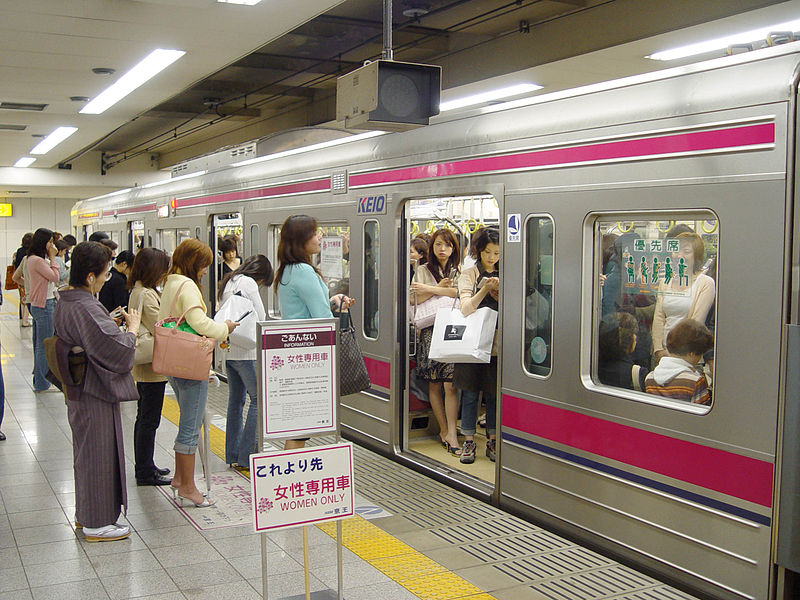Chikannery
Over the last decade or two, officials have tried to change this, with stricter sentencing for those convicted of the crime and awareness campaigns to help bring the issue to light. But by and large, these have not been very successful. While awareness and enforcement efforts have led to an increased number of victims filing reports, many victims are embarrassed to come forward. The problem is still widely believed to be rampant if not entirely out of control.
One of the newer solutions? Segregated trains.

As seen above, many Japanese transit providers have taken to providing women-only train cars. These cars were first introduced in 2000, when a private railway which provides service from Tokyo to the suburbs tested the concept during late-night runs. Over the five or so years subsequent, most other railways adopted a similar option, finding the offering popular (which should surprise no one). Even a large percentage of men approve of the addition of these cars. As ABC News pointed out, crowded trains lead to potentially false accusations of chikan (or of victims wrongly accusing an innocent man of his neighbor’s indiscretion), and at a fine of around $500 and up to seven years in prison, that’s something best avoided.
Interestingly, there’s no fine or threat or incarceration if a man gets on a women-only car. Doing so isn’t illegal, according to Japan Today. The rule, to the extent that it truly is one, is enforced by shaming. In an odd sense, the same thing that keeps women from reporting chikan — embarrassment — keeps men from violating the commuting space of Japanese straphangers. And the term “women-only” is somewhat inaccurate as well, as young children, the disabled, and some other males are customarily allowed in the cars.
Regardless, the innovation has proven somewhat successful and has found a home in other transit systems throughout the world. India, Brazil, Mexico, and a handful of other places have female-only transit options, aiming to stem a similar problem to the one encapsulated by the term “chikan.”
Bonus fact: In 2001, Dubai opened up a women-only bank. As the BBC reported, the purpose was to give women in the highly-conservative country a way to manage their finances without having to explain their transactions to the men in their lives. Specifically, the BBC noted that “in some cases,” the goal of the bank was to provide the customers some “secrecy from their husbands.” It must not have proven popular as in some sense, the bank was lost to history. Seven years later, another women-only bank with special amenities catering to women opened in Dubai, which the LA Times called “the first of its kind.”
From the Archives: Meal Ticket: The unusual passengers of Moscow’s subway system.
Related: “Transit Maps of the World,” purportedly “the first and only comprehensive collection of historic and current maps of every rapid-transit system on earth” according to its product description. That’s probably accurate, as the editorial reviews are outstanding. 4.6 stars on 47 customer reviews.
